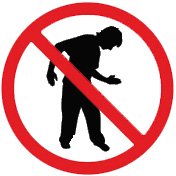We have all bumped into pay-per-click sites while looking for actually useful information. You know these sites. You type in a domain name, fully expecting to find a useful website, and all you find is a sponsored link generic page.
The Periplaneta Americana of the Internet

What you find
at motoguzzi.us
Up until I was about 26, my primary form of transportation was always a motorcycle. However, I never owned a bike that cost more than $600. In high school and college, I drooled over the Moto Guzzis that I would see from time to time that were hopelessly out of my financial reach. As soon as my bonus came in this year, I resolved to spend it on a Moto Guzzi.
I figured that Moto Guzzi would be at http://www.motoguzzi.com. No such luck. Let’s try http://www.motoguzzi.us. As you can see by clicking the image above, you don’t exactly wind up at Moto Guzzi’s website. (www.motoguzzi.com used to resolve to a pay-per-click site too, but it has since gone down)

Canadians looking
for Moto Guzzi
Canada will be
similarly disappointed
These pay-per-click pages and their operators are the parasites of the internet. I love when they put some goddamned phrase at the top like “find something interesting” or “helping you find what you need.”
Far from “helping you find what you need,” these sites do nothing except divert traffic from its intended destination. Trying to wipe them out is like playing whack-a-mole. Go find your favorite website. Lets presume that it is “The Drudge Report.” Now type in http://wwwdrudgereport.com/ (note that I forgot the period). Click it and see where you wind up – certainly no where near the Drudge Report. You can do this all day long — and you’ll find these crappy and annoying pages everywhere. I suspect that they outnumber “legitimate” websites at this point.
These pay-per-click sites are truly the Periplaneta americana of the internet.
And not only that, when these pay-per-click sites operate by using another person’s trademark, like Moto Guzzi, they are breaking the law. Under the ACPA (15 U.S.C. § 1125(d)), this kind of parasitic behavior can subject the pay-per-click domain owner to up to $100,000 in damages as well as forfeiture of the domain name, and possibly an attorneys’ fees award.
Dude, Where’s Your Blog?
Now that you know how I feel about pay-per-click sites, and you know that establishing one on the back of someone else’s trademark rights is illegal, lets take a look at a little GoDaddy issue, which served as the inspiration for this post.
GoDaddy runs its own pay-per-click program that isn’t really all that parasitic. If you buy a domain from GoDaddy (or any other registrar for that matter), you can “park” the page, and the registrar will turn it into a pay-per-click site for you. This is not, generally speaking, the kind of practice that I rail against, nor is it a violation of the ACPA. It is kind of like putting a billboard on a building that is under construction.
Imagine my annoyance a few days ago when I was trying to visit one of my favorite IP blawgs and entered the address into my browser.
I left off the “www” as I often do, since it is usually superfluous. See, if you type in legalsatyricon.com, or http://www.legalsatyricon.com, or http://www.legalsatyricon.com, you wind up at the same place — the Legal Satyricon — your intended destination (I hope).
So here is what I typed in: http://vegastrademarkattorney.com.

Is this cybersquatting?
Imagine my surprise when the page that came up said “this domain is parked,” and I was provided with a generic GoDaddy pay-per-click domain parking page! Had a cybersquatter stolen Mr. Gile’s domain and turned it into yet another plague-of-the-web pay-per-click site? Did Gile just give up the whole blawg concept in favor of collecting a few bucks a month in click-thru fees?
Just for giggles, I looked at the address in my browser and I entered the “www” — http://www.vegastrademarkattorney.com. When the familiar logo and layout popped up, I breathed a sigh of relief and thought little of it.
A few days later, I tried to visit one of my other favorite blogs, Nobody’s Business:
I entered in the following: http://bakelblog.com. Yikes! It appeared that one of my favorite libertarian blogs was gone! (note, by the time you read this, the issue may be corrected)
Lese majeste
scofflaw
and proud of it!
I thought, “oh no, did Queen Beatrix send her secret police to drag Rogier van Bakel from his island hideout to answer for the crime of insulting Dutch royalty?” As I loaded my Glock and started wondering who to call to assist me in my rescue mission, I considered trying one less drastic solution… I typed in the “www.” http://www.bakelblog.com
Relief… Rogier is still safe from being cast into an Amsterdam dungeon, and I don’t have to take on any Dutch prison guards.
Now that we have established that neither censors nor domain thieves have conspired to deprive me of some of my favorite reading material, I still must ask the question — WTF? It looks like GoDaddy is playing the cybersquatting game by slightly different rules.
Is GoDaddy Violating the ACPA?
When GoDaddy provides these pay-per-click pages instead of its customers websites, is the world’s largest registrar violating the Anti Cybersquatting Act? Maybe. Lets look at some pertinent portions of15 U.S.C. § 1125(d).
(d) Cyberpiracy prevention
(1) (A) A person shall be liable in a civil action by the owner of a mark, including a personal name which is protected as a mark under this section, if, without regard to the goods or services of the parties, that person –
(i) has a bad faith intent to profit from that mark, including a personal name which is protected as a mark under this section; and
(ii) registers, traffics in, or uses a domain name that –
(I) in the case of a mark that is distinctive at the time of registration of the domain name, is identical or confusingly similar to that mark;
Well, first of all we will need to decide whether Gile’s “Vegas Trademark Attorney” or van Bakel’s “Nobody’s Business” are trademarks. They are not registered marks, but registration is not required — trademark rights arise from use, not registration. I would say that “Nobody’s Business” certainly is a common law mark, and perhaps so is even “bakelblog”.
“Vegas Trademark Attorney” is super descriptive, and almost generic. However, that would only be the case if the services were “legal services.” For a blog, I’d say that the name qualifies for some degree of trademark protection. Add to that his secondary meaning, and I’m willing to say that both blogs’ names and domains are distinctive.
I realize that I am skipping a few details here, but this is a blog, not an appellate brief.
Next, lets see if Godaddy’s behavior fits within the ACPA’s prohibitions. There is no case law to guide us on this, since this particular kind of behavior hasn’t been dealt with in any reported case (at least none that I could find).
It sure looks to me like it fits.
Godaddy is “using” domain names that are supremely confusingly similar. In fact, Godaddy is actually using van Bakel and Gile’s domain names, absent the “www.” The “use” is for profit — the pages that Godaddy provided to me, instead of the pages I searched for, were chock full of sponsored links. GoDaddy makes advertising revenue off of them.
But is it Bad Faith?
15 U.S.C. §1125(d)(1)(B)(i)(I) thru (IX) provides nine nonexclusive factors to help us determine whether the use is in bad faith. None of them seem to fit neatly within this factual scenario. GoDaddy certainly is using these domains with an intent to profit — but in order to call this an ACPA violation, we need to say that it is a bad faith intent to profit.
At first blush, it sure seems like it is. Naturally, I alerted these two bloggers to the issue. Rogier van Bakel put on his journalist hat and went digging for the truth. His results suggest that GoDaddy gets a legal (but perhaps not moral) pass on this one.
GoDaddy gives its customers the option of having their site load without the visitor typing in the “www.” They do this by adjusting their “CNAME” settings. As I understand it, the CNAME is a kind of alias that, behind the scenes, automatically modifies a URL to go to a specified site. These websites’ CNAME’s were set adequately but not perfectly. Any GoDaddy user who fails to select the proper option will find some of their traffic re-directed to a sponsored link page, where coincidentally GoDaddy makes a few bucks on click-through fees.
However, ultimately, it does come down to the webmaster operating his account properly.
It seems that GoDaddy makes this needlessly complicated (or at least non-transparent), and that it should be a cinch for the company to autoforward, say, vegastrademarkattorney.com to the exact same place it takes you when you type http://www.vegastrademarkattorney.com. I fail to understand why any customer would prefer that a visitor who omits the “www” should be re-directed to a pay-per-click site — especially when such site gives the impression that the website the user sought has gone out of business (or worse).
But back to the legal question: Does GoDaddy’s conduct rise to the level of “bad faith?” At first, I was certain that it does. After Rogier’s research is taken into account, it appears that at least some (if not most) of the responsibility must fall on the shoulders of the user — who can control the issue at any time.
Does that make GoDaddy right? No. The default should be that internet users wind up where they intended to go. It is still parasitic and sleazy to draw traffic intended for someone else to your own money-making scheme. It is even sleazier when you do it to your own paying customers.
Rogier van Bakel contributed mightily to this post.
 And yes, I did eventually get my Guzzi!
And yes, I did eventually get my Guzzi!



 Posted by marcorandazza
Posted by marcorandazza 










 By RSS Feed
By RSS Feed